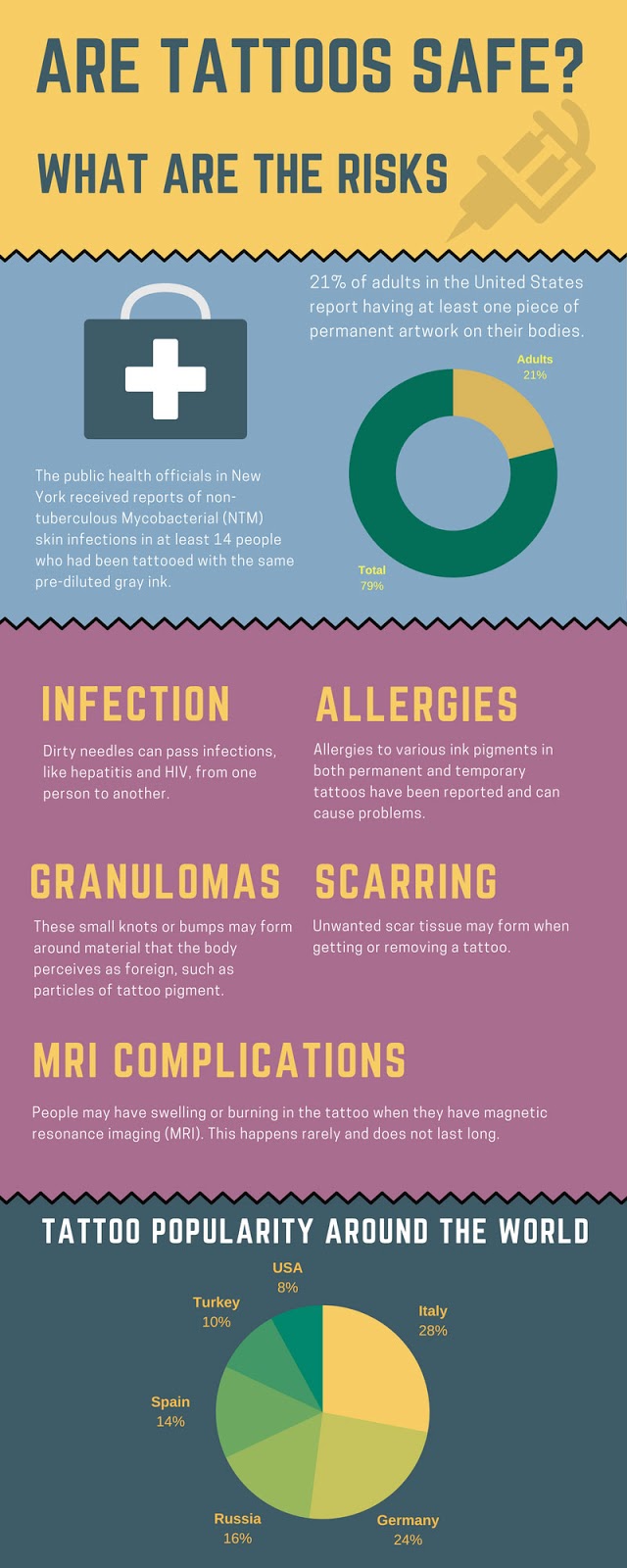Thinking of Inking? Understanding Tattoo Health Risks
A tattoo is more than just a design; it's a personal statement, a piece of art etched onto your skin. But before you take the plunge and get inked, it's essential to understand the potential health risks involved. From mild skin irritations to more serious infections, being aware of these potential complications is key to making an informed decision.
Thinking about getting a tattoo can be exciting, but it's important to remember that it's essentially a medical procedure. Needles puncture your skin, introducing ink into the dermis, and this process carries inherent risks. While these risks are generally low when proper precautions are taken, understanding them is crucial for anyone considering body art.
The potential dangers of tattooing aren't new. Historically, unsterilized equipment and inks led to significant health problems, including the spread of infectious diseases. Thankfully, modern tattooing practices have improved significantly, with stricter regulations and sterilization procedures. However, risks still exist, and it's vital to choose a reputable, licensed tattoo artist who adheres to safety guidelines.
One primary concern is the risk of infection. Bacteria can enter the skin during the tattooing process, leading to localized infections or, in rare cases, more serious systemic infections. Allergic reactions to tattoo ink, particularly red ink, are also possible. Symptoms can range from mild itching and redness to severe blistering and swelling.
Beyond infections and allergies, other potential health risks include granulomas, keloids, and MRI complications. Granulomas are small bumps that can form around tattoo ink, while keloids are raised scars that grow beyond the original tattoo boundaries. MRI scans can sometimes cause swelling or burning in the tattooed area, although this is usually temporary.
While discussing the health risks of tattoos primarily focuses on negative aspects, acknowledging the absence of inherent "benefits" to these risks is important. The focus should always be on mitigating these risks, not finding advantages in them. Safe tattooing practices are crucial for minimizing potential complications.
Choosing a reputable, licensed tattoo artist is paramount. Ensure the studio is clean and follows proper sterilization procedures. Ask questions about their ink sterilization process and aftercare instructions. Following proper aftercare, such as keeping the tattoo clean and moisturized, is crucial for preventing infection and promoting healing.
Advantages and Disadvantages of Considering Health Risks
| Advantages | Disadvantages |
|---|---|
| Informed decision-making | Potential anxiety |
| Reduced risk of complications | May deter some from getting tattoos |
Frequently Asked Questions:
1. What are the signs of a tattoo infection? Increased redness, swelling, pain, pus, and fever are potential signs of infection.
2. Can I get a tattoo if I have allergies? Consult a dermatologist and your tattoo artist if you have allergies, especially to metals or dyes.
3. How long does a tattoo take to heal? Typically, 2-4 weeks.
4. Can I donate blood after getting a tattoo? You may need to wait a few months after getting a tattoo to donate blood.
5. What should I do if I think my tattoo is infected? Consult a doctor immediately.
6. How can I find a reputable tattoo artist? Research local artists, check reviews, and visit studios to observe their hygiene practices.
7. Are there any long-term health risks associated with tattoos? Some inks may contain carcinogens; further research is ongoing.
8. Can tattoos be removed? Yes, laser removal is possible, but it can be expensive and time-consuming.
Tips and Tricks for Minimizing Tattoo Risks
Research tattoo artists thoroughly. Don't prioritize price over safety. Follow aftercare instructions diligently.
In conclusion, getting a tattoo is a personal choice that should be made with careful consideration of the potential health risks. While modern tattooing is safer than ever before, infections, allergic reactions, and other complications can still occur. By understanding these risks, choosing a reputable artist, and following proper aftercare procedures, you can significantly reduce the likelihood of experiencing these issues and enjoy your body art for years to come. Remember that your health is paramount, and taking the time to research and prepare is essential for a safe and positive tattoo experience. It's always a good idea to consult with a dermatologist or healthcare professional if you have any concerns or pre-existing conditions before getting a tattoo. By being informed and proactive, you can make a responsible decision that protects your health and allows you to enjoy the artistry of body ink.
Simple arm tattoos for women finding your perfect design
Navigating the diamond an in depth look at angels stadium seating map interactive
Unlocking fortnite can you still use your username














